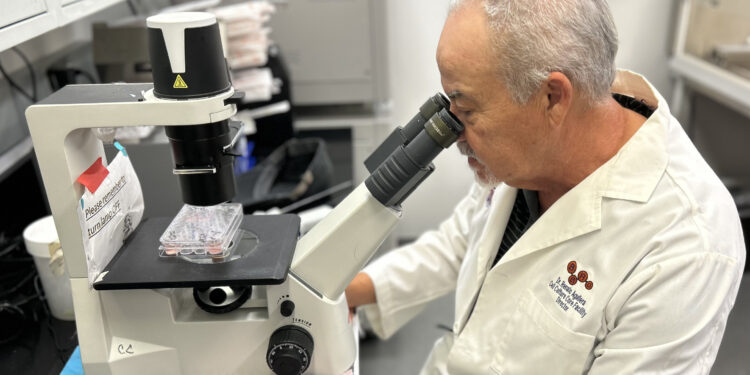Renato Aguilera, Ph.D., professor in the Department of Biological Sciences at the University of Texas at El Paso, is the principal investigator of a project that identified a new pharmaceutical compound that successfully kills leukemia cancer cells and of lymphoma, potentially opening the way to new forms of therapy. His team’s findings were recently published in the research journal PLOS One. Credit: University of Texas at El Paso.
Researchers at the University of Texas at El Paso have identified a new pharmaceutical compound that successfully kills leukemia and lymphoma cancer cells, potentially paving the way for new forms of therapy.
Renato Aguilera, Ph.D., professor in the Department of Biological Sciences, is the principal investigator on the project that identified the promising compound, called thiophene F-8. His team’s findings were published in the journal PLOS One.
“The main goal of my research is to discover new anticancer drugs that can eventually treat different types of cancer,” Aguilera explained. “This research not only yielded amazing results, but it also led to the training of five doctoral students who now work as postdoctoral fellows in research laboratories across the country.”
Leukemia is a cancer of the blood cells while lymphoma is a cancer of the immune system. As part of its research into the potential treatment of these cancers, Aguilera’s lab has screened drug compounds to determine their impact on various types of cancer cells.
Pharmaceutical companies generate millions of compounds, and their full range of uses is often unclear or unknown, Aguilera said. Some of these companies sell the generated compounds as chemical libraries, which researchers like Aguilera can then study to determine the precise effect of the compounds on human cells.
“The hardest part of this type of research is determining what exactly a drug does,” said Aguilera, who is also director of research infrastructure at UTEP’s Border Biomedical Research Center.
As part of the project, the UTEP team tested 1,300 different compounds on human cancer cell cultures. Thiophene F-8 was very successful in inducing programmed cell death in leukemia and lymphoma cells, essentially sending a message to the cells to commit suicide and inhibit the growth of new cancer cells.
Mia Swain, Ph.D., helped discover and conduct research on thiophene F-8 as a doctoral student at UTEP. Swain graduated from UTEP in December 2022 with a doctorate in biological sciences and is currently a postdoctoral researcher at Texas Tech University Health Sciences Center El Paso.
“Engaging in such a groundbreaking discovery has been truly rewarding,” Swain said. “The compound’s potential to work in conjunction with existing therapies could be life-changing for patients with leukemia and lymphoma.”
The UTEP team will continue to study the effectiveness of thiophene F-8. If the drug succeeds in further testing, Aguilera said, pharmaceutical companies could one day launch clinical studies to determine the compound’s effect on patients.
More information:
Risa Mia Swain et al, A thiophene derivative inflicts cytotoxicity via an apoptotic pathway intrinsic to human acute lymphoblastic leukemia cells, PLOS ONE (2023). DOI: 10.1371/journal.pone.0295441
Provided by the University of Texas at El Paso
Quote: Researchers discover compound that fights leukemia and lymphoma (January 12, 2024) retrieved January 12, 2024 from
This document is subject to copyright. Apart from fair use for private study or research purposes, no part may be reproduced without written permission. The content is provided for information only.



